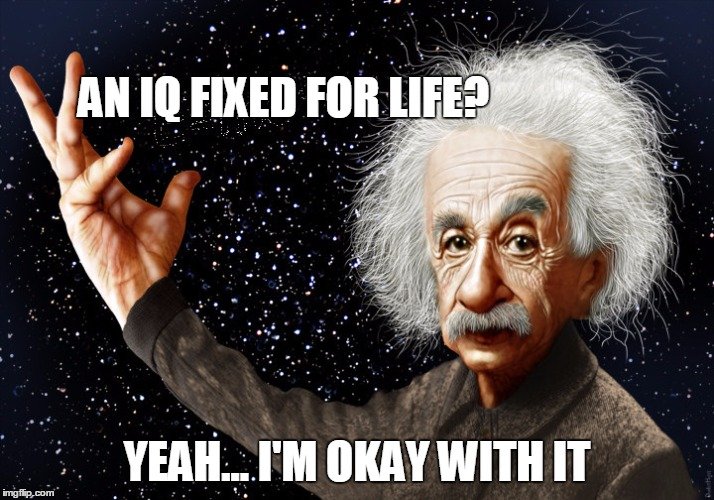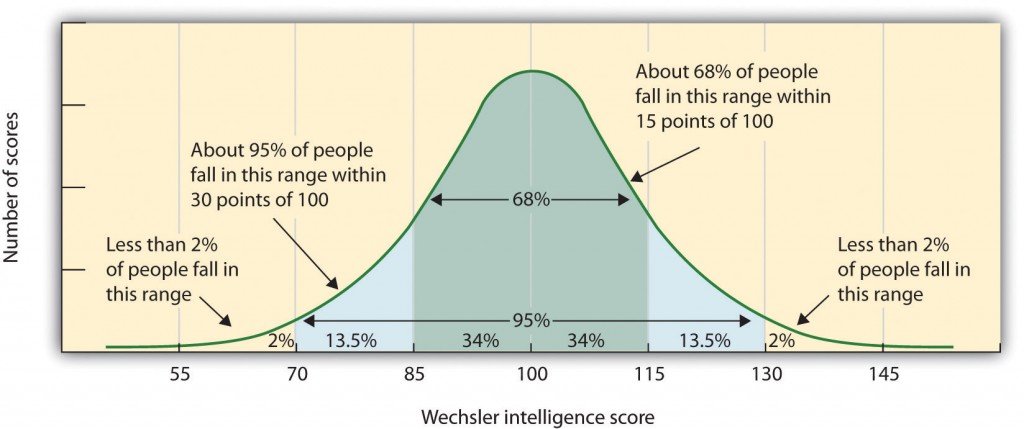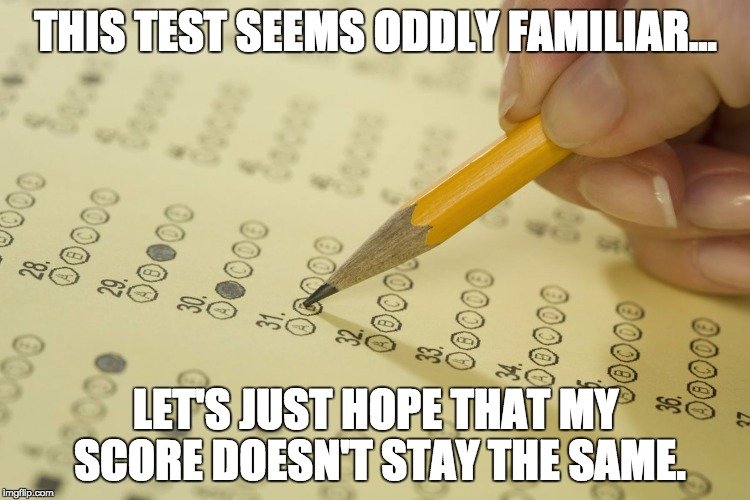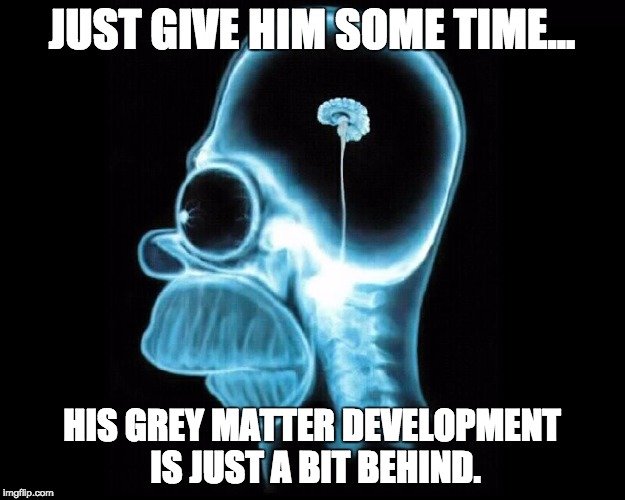Table of Contents (click to expand)
Your IQ is a measure of how smart you are compared to other people. It is measured by a series of standardized tests, and is believed to be fixed for life. However, this is not actually true, as your IQ can change depending on your environment and how you learn.
Human beings seem to be inherently competitive in everything from athletics and politics to personal wealth and the appearance of our spouses. We seem to enjoy ranking ourselves in comparison to others, and this is especially true when it comes to intelligence. One of the most widely used and well known measurements of intelligence is the IQ test, which refers to a series of standardized tests believed to give a fair estimate of your intelligence relative to the rest of the population.
Your IQ (which stands for intelligence quotient) would probably be forgotten or ignored after your academic career, just like every other standardized test score (ACT, SAT, etc.), except there is a unique claim about IQ that makes it stick out. For the better part of the last century, people believed that your IQ score was fixed for life!

Before you start celebrating or lamenting your intellectual destiny based on your IQ score, perhaps we should ask… is it possible for your IQ score to change?
The short answer… absolutely, but if we’re going to discount a decades-old belief, we should get the whole story…
Before we get into details about, it interesting to study table proposed by Lewis Tarman–a renown psychologist from Stanford that classified intelligence based on IQ scores:
- Above 140: Genius
- 120-140: Superior intelligence
- 110-120: High intelligence
- 90-110: Normal/average intelligence
- 80-90: Low intelligence
- 70-80: Borderline deficiency
- Below 70: Definite feeble-mindedness
First Of All, What Is An IQ Test?
The term IQ test actually refers to a number of different standardized tests designed to measure human intelligence. These tests focus on non-specific knowledge and skills, rather than facts and calculations. For example, most IQ tests include visual-based and verbal-based questions that highlight reasoning skills, rationality, mathematics, spatial skills, problem-solving, pattern recognition, retention and memory, multi-tasking, and logic. This broad scope of examination is intended to exclude or disadvantage as few test-takers as possible.
The brilliance of an IQ test is its standardization, meaning that a median score of 100 is always used, along with a standard deviation of 15 points. This gives a normal range of 85-115, which is where the majority of the population tends to fall, and then less frequent outliers. The highest IQ in history is unknown, but is believed to be in the range of 250-300… now that’s a genius! The bell curve of a population’s IQ in a given age range always has a median of 100.

The use of a person’s age and score allows for a relative measurement of intelligence to be established, and as people get older, their place within that range tends to remain the same. This has led to the belief that IQ is static throughout our lives, but in reality, it is more an issue of population statistics and trends in education. As we experience the world and get “smarter”, so do most other people our age, resulting in similar IQ scores over time. The fact is, everyone is becoming “more intelligent” over the course of their lifetime, but the IQ scale keeps everyone in the same context.
Also Read: What Is The IQ Scale Range?
The Science Of Intelligence
The format of an IQ test and the way that they are scored is what made them so famous back in the early 1900s. Created by a Germany psychologist, William Stern, the intelligence quotient was first used to test the intelligence of children, by creating a ratio of their biological age to their score on an IQ test. This was intended to show their rate of learning, and thus, their capacity for intelligence. As mentioned before, many people believed that this “rate of learning” would remain the same over time, and many early researchers supported this idea.

In general, if a person has a low IQ as a child, then there is a good chance they will have a low IQ as an adult. The same is true for those of average and high intelligence. Boosting your intelligence not only comes down to what you learn or how “smart” you are; it is based on your ability to use different skills and toolsets to learn, retain, and access knowledge in better and more efficient ways.
Intellectual ability is largely believed to be inherited, but the exact mechanism for that is not entirely known; also, more modern research argues that a combination of “nature and nurture” results in our intelligence. Put simply,despite decades of genetic research attempting to find a link between genes and IQ scores, intelligence and intellectual capacity is not predestined from birth. Certain environmental, social, cognitive, cultural and familial variables do affect your intelligence as you grow up.

Essentially, if you are born into an impoverished area with little access to education and a limited capacity for self-improvement, there is a good chance your external conditions will remain that way into the future; thus, your IQ may remain similar over years or even decades. However, it is wildly incorrect to think that an individual cannot change their surroundings, stimuli, and behavioral patterns, which could change their use of knowledge and boost their relative IQ.
Furthermore, not every brain develops at the same rate, and many studies have found significant changes in grey matter density among children at the same age and apparent developmental stage. Many of these fluctuations can “even out” as we grow up. In other words, the maturation of our bodies and brains may directly impact the strength and speed of our cognitive processes, making early IQ assessments more variable.

Also Read: 11 People Who Have The Highest IQ In The World
The Fallacy Of A Fixed IQ
The idea that we cannot improve our IQ is not only incorrect, but dangerous for our educational ambitions. It is entirely possible to use someone’s existing knowledge and show them how to use it more efficiently, by improving their organization, comprehension, or time-management skills, for example. The way that we classify, categorize, taxonomize, and access knowledge can be improved as we age, and thus our IQ scores can definitely increase (and decrease, if we don’t keep our brains actively improving!).

The concept of “learning how to learn” is very important when discussing IQ. Over time, human beings can become better at learning and interacting with the world by using new techniques for memory and deduction, while applying retained lessons and coordinating knowledge in many different areas. In this way, the fundamental aspects of our “intelligence” (fluid intelligence, reasoning, problem-solving, visuospatial skills) can definitely be improved.
Therefore, next time someone tries to tell you that you’re stuck with the same IQ forever, tell them that having such a foolish idea makes them look pretty dumb… maybe they should update their own IQ score!
How well do you understand the article above!

